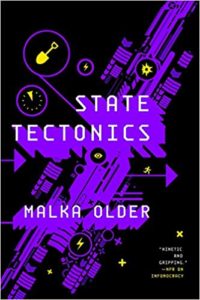State Tectonics concludes Malka Older’s Centenal Cycle trilogy, bringing to a head the tensions and potentials for change that have been laid in Infomocracy and continued through Null States.
By the end of the second volume of the Centenal Cycle, Null States, the threats to the 21st century political and social order, the dominance of 100,000 person micro democracies, the centenals, has been laid bare and made clear. Sure, the remaining legacy nations have their problems with the dominant Centenal system and might, like China, seek to subvert it and change it for its own ends. Other more militaristic nations might overwhelm nearby Centenals. But the greatest threat to the Centenal system is a hitherto unknown one—one from inside Information itself.

Malka Older’s State Tectonics brings the story of these challenges to this political system to the fore and to a head.
The novel begins and ends with its strong cast. Since her first appearance in Infomocracy, Mishima has been, for me, the star of the series. For a novel about politics, and social systems, and the future of democracy, it has amused me that one of the central characters is, in fact and practice, a secret agent. Even more so that she has narrative disorder, which is an interesting bit of meta reflection on the fact that she’s a character in a novel. Both of these are tensions that the author has played with, especially with her secret agent outing in Null States. Here, in the third novel, Mishima’s attempt to slide into politics, her secret agent cover blown, does not quite go as well as hoped. But, as you might expect, Mishima’s old skills are not exactly out of fashion, and still prove useful. Maryam gets a lot more of the heavy lifting of that sort of business, and with her dealing with the pitfalls of relationships as well as investigations, she gets a lot of play, building on her expanded role in Null States. Ken remains Mishima’s anchor and solid point.
The depiction of her global world, a feature of the first two novels, continues. Not only the global settings and once again, showing the world is far more than the United States, but the evolution and development of that global culture is a real hallmark of the series, and these novels. The global fusion cuisines imagined by Older in the novel continually made me hungry, wishing that the improbable and yet delicious sounding mergings of distant cultures’ cuisines were things I could easily make, or get, right there and then. Older uses food and meals as a way to anchor her characters to her world, to her plot, and in the end to each other.
More than the characters, even such distinctive characters such as Mishima, and Maryam, and Ken, and more than the global stage and setting for the novel, this is ultimately a novel, a series about ideas. Older has had a big idea brewing since the beginning of Infomocracy and she brings that conclusion in her political SF thesis here. What needs to happen for global democracy? What happens when change occurs? The ultimate answer, that Older provides, is that there is in the end no steady-state final form to societies. Even as the Centenals and the search engine Information broke the back of the Westphalian concept of the Nation State, by the end of State Tectonics, it is clear that the Centenal form of organizing the world is itself only yet a step in the process, and that it too, must change and grow. We saw that in the first volume, in the contested election in Infomocracy; we saw that in Null States in how the remaining traditional nation states relationship with the Centenals provides a constant challenge, and we see it here in State Tectonics. In the end, the Centenals must evolve and change and grow and adapt, themselves, or be replaced by another political form. It’s a message that applies to our own democracy, our own world order today. Democracy must evolve, adapt and change…or it indeed will die and be replaced by something else, and not necessarily for the better.
Near future SF is hard to do, with recent politics, changes in technology, and social evolution making a plausible future (for predicting the future explicitly is not what SF is created to do) more and more difficult. The number of “asks” in Older’s universe to set the stage for how her political future could evolve boil down to do—a way to defang firearms, and the rise of even more powerful search engine technology. With those asks, Older provides a near future SF trilogy that reflects on our world, shows how things could be, and provides entertaining and thought provoking science fiction. This is one of the best completed series in recent years and in my view, worthy of a Hugo nomination for same.
With State Tectonics, and the series complete, I am invested and interested in what worlds Older will turn to next.







